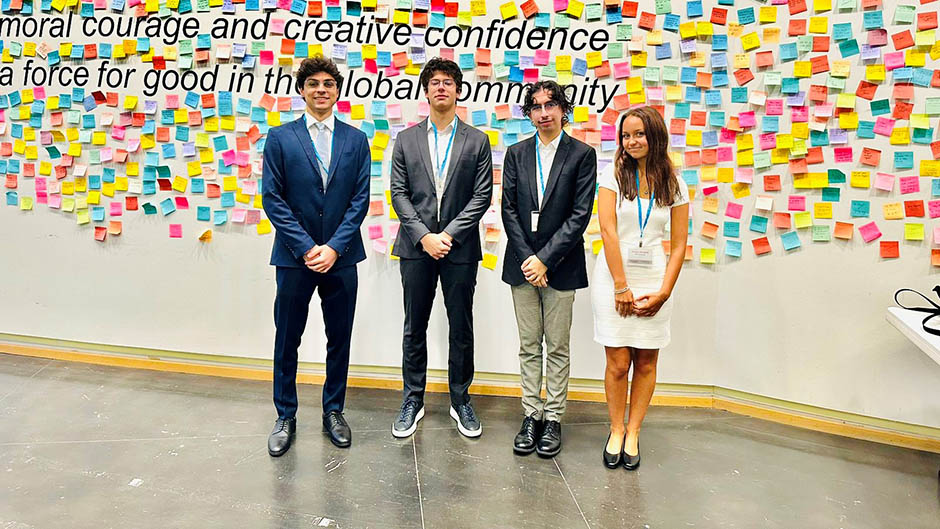Miami Herbert Business School graduate students placed first in the business sustainability division at the International Business Ethics and Sustainability Case Competition (IBESCC). At the competition, there were 37 teams, 25 universities, and six countries represented, for a total of 187 competitors.
IBESCC is the nation’s oldest and most prestigious event. Undergraduate and graduate students from around the world participate in the annual competition to identify problems and present solutions to some of the most pressing ethical issues in global business today.
This year’s IBESCC was a hybrid competition held virtually and on the campus of Loyola Marymount University during the week of April 10-14. Teams of three to five members competed in three segments (25 minutes, 10 minutes, and 90 seconds) during the event.
For the first time since the pandemic, Miami Herbert undergraduate IBESCC team competed in person in Los Angeles, Calif., and Miami Herbert had a graduate business team in the competition. The teams argued the use of mineral components like cobalt in Apple’s products, and the efforts to move away from diesel in heavy-duty trucks from legal, ethical, financial, and sustainable perspectives.
The undergraduate team (GR&P Consulting) consisted of Joaquin Martinez, philosophy and linguistics; Armeen Khazraee, legal studies; André Benicio, legal studies; and Sydney Rothka, finance and business law. The graduate team (Madini Consulting), who competed virtually, included Soma Munnangi, Andreina Vanoni, Paloma Guerreiro, Diego Jenkins, Tiana Montague, and Ahmad Alosaimi, all graduate students in Miami Herbert’s Master in International Business program.
“We are very lucky to have students, a school, and leadership committed to extra-curricular activities that develop sense of purpose, global mindsets, and principled decision-makers,” said Miami Herbert professor Joan Martinez Evora, who coached the teams this year. “We are thrilled with their participation and, of course, with the first-place result of the graduate team in the 90 second business sustainability division of the competition.”
Lessons Learned, Suggestions, and Experiences
“Our students picked a topic that is not only relevant but a genuine dilemma with no easy answer for governments, tech companies, and ultimately modern consumers of technology products such as iPads and iPhones,” said Martinez Evora. “I was impressed with the quality of their presentations and their personal knowledge of the subject matter.”
“In terms of lessons learned from this experience—perseverance and hard work are crucial,” said Munnangi, the graduate team captain. “It takes a lot of effort and dedication to excel in any field, and competitions provide an opportunity to push oneself to the limit and strive for excellence.”
Martinez Evora believes that having passion and knowledge for a topic and being creative in the delivery of a presentation can go a long way. In terms of suggestions to students preparing for future competitions, he suggested finding an issue that is of interest to the group and relevant in today's business world: “We are advocating businesses and presenting solutions, so from that perspective, teams need to send clear messages of hope that together we can become a force for good and positively impact society, not naively, but critically and realistically.”
Munnangi shared four strategies for students preparing for competitions. First, start early and be consistent: “Success in competitions requires consistent effort over an extended period.” Second, focus on building a strong foundation: “Ensure that you have a solid understanding of the basics and fundamental concepts in the subject area.” Third, practice, practice, practice: “Consistent practice is key to improving your skills and knowledge.” And fourth, seek feedback and learn from mistakes: “Accepting feedback and using it to improve is essential to the learning process.”
Such competition experience shapes the academic journey at Miami Herbert, as attested by both students and faculty.
“Winning a competition can be a significant boost to one's confidence and motivation,” said Munnangi. “It can inspire individuals to pursue their goals with renewed vigor and dedication. The skills and knowledge gained through the preparation process are valuable assets for future endeavors, both in academic and personal settings.”
“Often, we have stellar undergraduate business students who later also pursue graduate business degrees as they decide to take their career journeys to the next level,” said Martinez Evora.
For Martinez Evora, seeing some of the same students who competed now preparing to graduate with their master's degrees this May is inspiring.
“Let us think about it, a competition not for credit, not for a grade, not for a class, but for the curiosity of learning and addressing real global business problems, then graduation… Absolutely amazing what they accomplished.”

